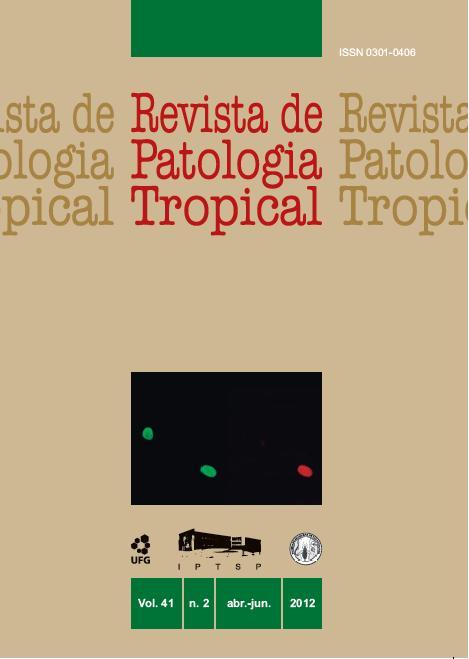PHLEBOTOMINES IN THE AREA ADJACENT TO THE PORTO PRIMAVERA DAM, BETWEEN SÃO PAULO AND MATO GROSSO DO SUL STATES, BRAZIL
DOI:
https://doi.org/10.5216/rpt.v41i2.19323Keywords:
Sand flies, Leishmaniasis, Vector, Porto Primavera dam.Abstract
A research project with the purpose of investigating the Culicidae mosquito fauna and Anopheles ecology was undertaken before, during and after the construction of Porto Primavera dam on the Paraná River, between São Paulo (SP) and Mato Grosso do Sul (MS) States, between 1997 and 2003. The objective of this article is to report on the species of sand flies that were also captured during the collections undertaken with Shannon traps and human bait. A total of 526 (430?, 96?) specimens, 73 (2?, 71?) with human bait and 453 (94?, 359?) with Shannon traps were captured, belongingto seven species: Bichromomyia flavisculellata (6?), Brumptomyia sp. (1?), Evandromyia sp. (2?), Lutzomyia almerioi (1?, 2?), Nyssomyia neivai (92?, 412?), Psathyromyia punctigeniculata (2?) and Psathyromyia shannoni (3?, 5?). Ny. neivai, a probable vector of Leishmania braziliensis, predominated (95.8%). Bi. flaviscutellata, the main vector of Leishmania amazonensis, is reported here for the first time in the west of SP and Lu. almerioi, an anthropophilic species, was captured for the first time in SP. Thus more studies are necessary in this region since these three species of sand flies may represent a risk for the transmission of Leishmania spp. to people frequenting the forested banks of this reservoir.
Downloads
Downloads
How to Cite
Issue
Section
License
The manuscript submission must be accompanied by a letter signed by all authors stating the full name and email address, confirming that the material has not been published or is under consideration for publication elsewhere, and agreeing to transfer copyright in all media and formats for Journal of Tropical Pathology. The authors will not be paid for published articles. They are solely responsible for the content of those articles, even if the Editor holds the right to adjust them to the norms of the journal.
The reviewers will not be paid for the peer review process.

